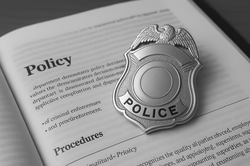Leading in the Grey: Why Discipline Should Build, Not Break, Officers
Leading in the Grey: Why Discipline Should Build, Not Break, Officers

Denver’s police chief recently made headlines by rethinking how officer discipline is handled—and it’s about time this conversation made its way to every law enforcement agency in the country.
For too long, discipline in policing has been treated like a hammer: blunt, forceful, and often used to make an example out of someone rather than make them better. But leadership isn’t about punishment. It’s about behavior modification. It’s about coaching, course-correcting, and developing people into stronger professionals.
Here’s the uncomfortable truth: too many supervisors are quick to write someone up instead of stepping in, stepping up, and actually leading. Why? Because it’s easier to manage in black and white—policy, procedure, and paperwork. What’s hard is leading in the grey, where most of this profession actually lives.
The grey is where context matters. Where human behavior, emotion, and decision-making intersect. It’s where we ask not only what happened, but why—and whether the issue is a gap in training or a failure in character.
I’ve sat across the table from officers who didn’t need discipline—they needed a mentor. They didn’t need to be “made an example of”—they needed someone to believe in their potential and guide them forward. And yes, I’ve also been in the room when the hard decisions had to be made because someone crossed a line they knew they shouldn’t. There’s a difference. One is a mistake of the mind. The other, a mistake of the heart. And they should never be treated the same.
Yet far too often, HR departments, personnel boards, and city attorneys default to a one-size-fits-all model of “fairness.” Paint everyone with the same broad brush, and you avoid liability—right? But that’s not leadership. That’s liability avoidance disguised as accountability.
Leadership requires nuance. It demands courage. And it starts with being willing to challenge the systems, policies, and attitudes that make it easier to fire someone than to fix them.
If we want to retain good officers, create meaningful change, and build departments people want to be part of, we need to stop being afraid of the grey. We need to lead with courage, empathy, and accountability—because discipline without development doesn’t build better cops. It just creates resentment.
And if we only lead by the book, we’ll never build people worth writing about.

